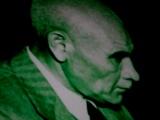 This was one corner of a photograph I came across at the War Remnants Museum, HoChiMinh City. Amongst the many startling pictures on the wall there, this one stood out, as the face seemed familiar. The face of a Nung mercenary.
This was one corner of a photograph I came across at the War Remnants Museum, HoChiMinh City. Amongst the many startling pictures on the wall there, this one stood out, as the face seemed familiar. The face of a Nung mercenary.The caption (*) beneath the photo says: Duc Phong, Vietnam 1966. A viet cong suspect is hung up and questioned by mercenaries of the Chinese Nung tribe. The Nungs formed a special forces unit, organised and commanded by US special forces. After 15 minute in this position, suspect admitted being the sniper who had earlier fired on refugees sheltered in a church.
The big picture explains much more. The stillness in the jungle air; eerie silence followed by verbal rat-a-tat & some rifle punches in the gonads. And finally the bullet goes off.
Those were the better days for the Nung mercenaries. Early days of the war in Vietnam - aligned with the US Forces, and widely expected to aid the South Vietnamese in sending their communist Northern brethren back into stone age. A quick buck from what they know best - killing, and eventually moving on. Perfect.
We all now know that things ended up very differently. Not many survived the war. The viet cong steadfastly pursued the Nungs all over the country well after the American departure: ensuring that there will be no comebacks. From being seasoned survivors all their life, some of the Nungs did manage to escape. Into Cambodia, Laos primarily. Few groups emerged in China, Indonesia and in South East Asia. And specifically Singapore.
On hindsight, it is quite logical that Singapore was the preferred unlikely destination for the Nungs. Not having any tradeable skill they could call their own; tried their hand at almost everything. At the same time, the island country was just emerging from the depths of their post colonial confusion - in the process of locating their identity & relevance in the modern world.
The Nungs discovered that trading came quite naturally - and so did Singapore. Commodities, textile, oil, spices anything. Found themselves slowly entrenched in a society that was filled with immigrants - and similarly looking to survive in a relatively independent, peaceful new age. No racial profiling; no checks on their past and likely intentions.
That of course was many years ago. The Nung Identity has been since forgotten, without much protest. And the absorption complete. But if you know what I am talking about, its easy to discover a Nung from time to time. And thats where I recognise the face.
Heres, the big picture:
* The only piece of truth in this post

